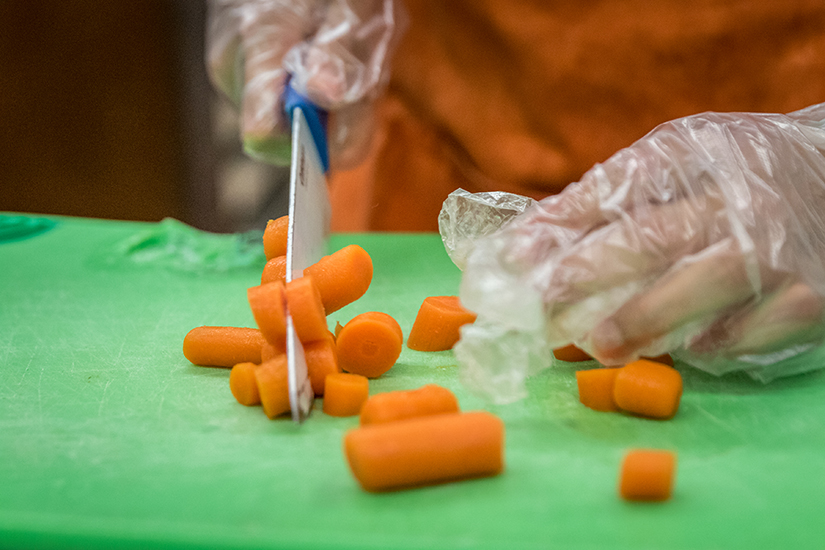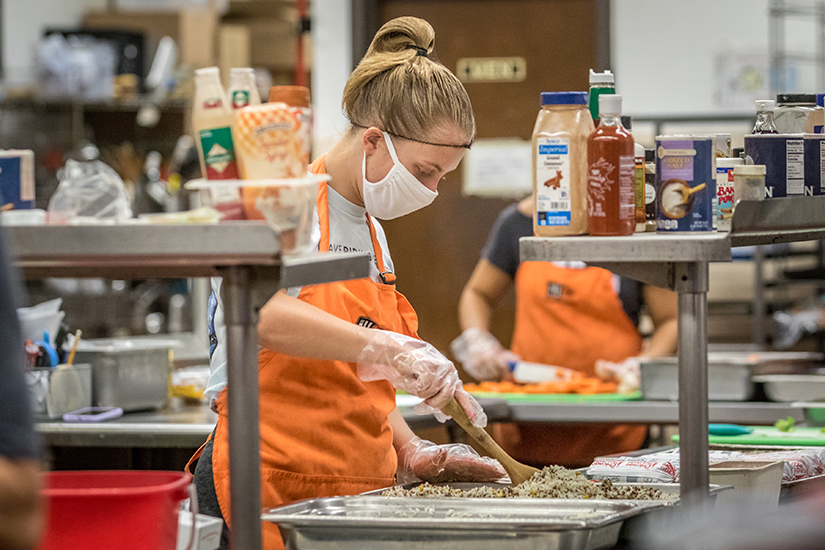Alayna Parsons seasoned the large tray of cauliflower, brussels sprouts and broccoli that would be baked to perfection, adding basil, garlic, salt and pepper. She mixed in a sprinkling of oil.
It’s part of a labor of love for Saint Louis University students who volunteer with SLU’s Campus Kitchen, an organization dedicated to food justice and helping people in need of food in and around the Midtown campus.
 Student volunteer Lauren Ramirez chopped carrots for shepherd’s pie Sept. 16.Photo Credits: Lisa JohnstonParsons, a SLU junior studying biology, called Campus Kitchen a perfect volunteer project for her service fraternity, Alpha Phi Omega.
Student volunteer Lauren Ramirez chopped carrots for shepherd’s pie Sept. 16.Photo Credits: Lisa JohnstonParsons, a SLU junior studying biology, called Campus Kitchen a perfect volunteer project for her service fraternity, Alpha Phi Omega.
But, “I don’t do it for the (service) hours anymore,” Parsons said. “I like making the food for people, making sure it’s safe, and seeing all the things you can come up with.”
The shepherd’s pie they made that day went with a baked vegetable dish and cinnamon bread for dessert.
Parsons noted that her faith is connected with service since her home parish, St. Patrick in Wentzville, stresses helping people in poverty and compassion for people who have unequal opportunities.
Hundreds of meals
Campus Kitchen volunteers work five days a week. They provide 400 meals each week to people who are food insecure. They serve seniors and residents of subsidized housing near the SLU campus, people in emergency shelters and transitional housing and clients of nonprofits such as Father Dempsey’s Charities, Our Lady’s Inn, Women’s Safe House and the College Church Outreach. The kitchen is available for any student or SLU community member who is experiencing food insecurity. Some of the nonprofits receive fresh food.
In June and July, the kitchen supplied about 2,500 meals each month, with the increased number going to housing set up for people who were unhoused after they relocated from a tent encampment.
Melissa Apprill, program coordinator of Campus Kitchen and a parishioner of St. Gabriel in St. Louis, called it a food justice initiative, using donated food that otherwise would be wasted and by providing meals to those who are hungry.
Campus Kitchen receives approximately 1,000 pounds of food weekly from a community partner, Trader Joe’s. This is food that would be thrown away as unsellable product because of a smashed box top, one bad apple in a five-pound bag or one broken egg in a container, or too close to the “best by” date, for example. A smaller amount of food comes from catering and dining halls on campus and from the federal USDA/Emergency Food Assistance Program.
Campus Kitchen is guided by a leadership team of 15 students who work with about 40 volunteers each week in shifts doing cooking, baking, packing and delivery.
Most volunteers are SLU students, Before the pandemic, some Catholic high schools students also volunteered.
‘With and for Others’
Elyse Lewandowski, president of the student leadership, said, “as a Catholic, I’ve always been involved in service in the community. When I came to college I was just looking to continue to serve people in the community.” She added that she and her mom cooked meals at a domestic violence shelter in St. Cloud, Minnesota.
She chose SLU in part because of its Jesuit mission “with and for others,” Lewandowski said. “We are living out that mission and building relationships with our community through food. Being able to build those relationships and provide the love of Jesus to those we are serving is what’s really important to me.”
She attends Mass at St. Francis Xavier (College Church), a campus parish served by Jesuits.
A sense of community
The effort also raises awareness of topics such as the food deserts in part of St. Louis without access to grocery stores.
Shane Todd, an aerospace engineering student who grew up in St. Thomas More Parish in Denver, delivered food on a mid-September day to a few people in the two apartment complexes across from the campus. It brings a sense of community with the residents, he said. “It’s a little thing that makes such an impact on lives,” he said.
Andrea Reibeling, a resident of one of the apartments where Todd brought meals, is the home health aid for her brother. “Sometimes I don’t have transportation to go to the grocery store,” she said.
With her brother’s treatment for cancer and the coronavirus pandemic, she said, it’s best that she goes out as seldom as possible, anyway. “We really like the way they fix the food; it’s very healthy. He’s getting well from eating right. I’ve been avoiding diabetic behavior myself, and I try to eat the right things, so this is really working to my favor, too.”
The students include messages in the packaging such as “You are loved,” “Have a great day,” “Hang in there” and other positive thoughts. “It’s things I need to hear. I’m not able to be in contact with people or be around my friends a lot,” Reibeling said. Student volunteer Arrington Jensen mixed rice in St. Louis University’s Campus Kitchen as a team cooked meals for those in need at Saint Louis University’s Reinert Hall.Photo Credits: Lisa Johnston
Student volunteer Arrington Jensen mixed rice in St. Louis University’s Campus Kitchen as a team cooked meals for those in need at Saint Louis University’s Reinert Hall.Photo Credits: Lisa Johnston
>> Campus Kitchen
Saint Louis University’s Campus Kitchen began operating in 2001 and is a student-led volunteer organization dedicated to fighting for food justice.
It was the first of what at one time was 65 programs on campuses across the country led by a group in Washington, D.C. Last fall, the network folded, and Campus Kitchen is now under SLU’s oversight through the Center for Service and Community Engagement.
Campus Kitchen operates 12 months a year, continuing during winter, spring and summer breaks and even when classes moved online during the initial months of the COVID-19 pandemic with students and community volunteers.
“There are no breaks in food delivery for people who are food insecure,” said Melissa Apprill, program coordinator.
Funds are sought to purchase paper products and extra food. Also sought are donations of food items such as butter and bakery ingredients. Grants are sought to fund the program coordinator position. For information, call (314) 977-3881, email [email protected] or contact CampusKitchen@SaintLouisUniversity on Messenger.
>> Reflection
Another aspect of Campus Kitchen is helping student-volunteers reflect deeper on issues affecting poverty, especially food insecurity, and to consider advocating for change.
Recently, Saint Louis University junior Denise Gomez prepared this reflection, quoting in part Sherita Mouzon, a community engagement specialist at Drexel University:
“How are racism and hunger related? Being mistreated at school, on the job, in health care and beyond, translates to lower wages and exclusion from society. When employers discriminate, people of color make lower wages than white people. When health-care providers discriminate, people cannot get the health care they need, and when the courts and the police are biased, they are more likely to put our family members behind bars, which damages their prospects for economic security.
“Although levels of food insecurity have declined and risen over the past few decades, one trend that has continued to persist is the gap in the prevalence of food insecurity between people of color and whites. An analysis examining trends in food insecurity from 2001 to 2016 found that food insecurity rates for both Black and Hispanic households were at least twice that of non-Hispanic white households (U.S. Department of Agriculture study).
“The higher rates of food insecurity and poverty and the racial wealth gap are a direct result of systemic racial and gender discrimination in virtually every aspect of American life. Although slavery was abolished more than 150 years ago, the legacy of oppression has lived on through policies that have trapped millions of Black Americans in poverty for generations.
“Throughout the next month, we will discuss how specific factors like housing segregation contributed to the racial inequities we see today, specifically in St. Louis, and how we can improve our current systems so that race can no longer predict the likelihood that a family is food insecure.”
>> Community service ranking
Saint Louis University has been recognized by The Princeton Review in its newly-released Best 386 Colleges: 2021 Edition, ranked No. 2 in the nation as the university most engaged in community service.
Saint Louis University captured the top spot on the list in 2018 as the university put additional focus on SLU’s service tradition during its bicentennial year. As part of the 200-Years-In-One-Challenge, the SLU community tracked time spent volunteering, mentoring and improving the community, eventually logging 1.98 million service hours.
The Best 385 Colleges rankings are based on surveys of 143,000 students at 386 top colleges that includes a wide representation by region, size, selectivity and character.
FOOD WASTE AND SLU’S CAMPUS KITCHEN RECOVERY:
 Photo Credits: Illustration by Abigail Witte• Approximately 40% of food produced in the U.S. is wasted per year.
Photo Credits: Illustration by Abigail Witte• Approximately 40% of food produced in the U.S. is wasted per year.
(Yale Climate Connections)
• Food waste is responsible for 8% of global greenhouse gas emissions annually. (U.N. Food and Agriculture Organization)
• In 2019, SLU’s Campus Kitchen recovered a total of 69,236 pounds of food (on track to recover a similar amount this year).
• 49,842 pounds from Trader Joe’s
• 1,126 pounds from Catering/Dining Halls on Campus
• 18,268 pounds from USDA/TEFAP